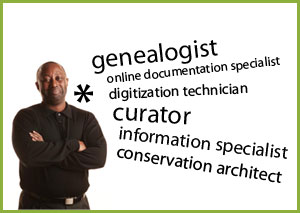Careers In Culture
Heritage - What You Need to Do
Career Routes
On this page:
- Getting from here to there
- Moving towards your heritage career
- Hands-on experience
- Your education can take you places
Getting from here to there
Interested in a career in heritage? Maybe you want to be an information specialist, a curator, a conservation architect, a digitization technician, a genealogist or an online documentation specialist. Perhaps you want to work in government, or for a museum or heritage agency. Maybe you want to be an independent contractor producing virtual exhibits or developing heritage education programs.
Whatever you decide, the heritage field offers many occupations and career routes. Most people work in different areas within an agency, or move from one government department to another, or move in and out of freelance work. There's no fixed route into a career in heritage.

Moving towards your heritage career
People come to careers in heritage from a wide variety of educational backgrounds. Your career route will be unique, depending on the type of work you want to do, and the opportunities that you seek out and find.
Seven Keys to a Successful Career Path
In addition to your education, seven of the most important skills you'll need for your career in heritage are:
- Heritage enthusiasm – being curious enough to learn all the stories you can about your family, community, region or country.
- Good communication skills – having the capacity to get your ideas across clearly verbally and in writing, in as many languages as you can.
- Networking – connecting with people working in this sector who can support you in your career goals.
- Research and investigative skills – developing a curiosity and an ability to investigate the story behind the story that interests you.
- Hands-on experience – working or volunteering in museums, archives, libraries, heritage fairs, etc...
- Historical knowledge – reading as much as you can about different periods in history.
- Business and technical skills – developing entrepreneurial and new technology skills.
Hands-on experience
When you look for work in the heritage sector, employers will want to know what experience you've had. Don't forget: volunteer experience is valuable too. Use the following checklist to see how you can build your knowledge of the workplace and make useful contacts.
If I'm a student, I could ...
- Volunteer at a local historic site, museum, archives, gallery, heritage agency/society, park or nature reserve.
- Write about a local heritage site for my community or school newspaper.
- Get a summer job at a local museum, park or historic site.
- Take on a co-op placement at a heritage agency/society.
- Volunteer at my local library or school library.
- Get to know the story of my community's history.
- Attend local heritage fairs, festivals or other events.
- Upgrade my computer design skills.
If I'm an emerging artist, I could ...
- Submit photography, cartoons or drawings for a local event.
- Design posters, flyers or websites for local heritage organizations.
- Attend talks or workshops on heritage issues and activities given by professional associations or educational institutions.
- Take night or weekend heritage-related courses at community college or Cégep.
- Upgrade my computer and fundraising skills.
- Volunteer at a local historic site, museum, archives, gallery, heritage agency/society, park or nature reserve.
- Get to know my community history.
- Help create a website for my local heritage agency/society.
- Attend local heritage fairs, festivals or other events.
If I want to move into this work from another sector, I could ...
- Design posters, flyers or websites for local heritage organizations.
- Attend talks or workshops on heritage issues and activities given by professional associations or educational institutions.
- Take night or weekend heritage-related courses at community college or Cégep
- Upgrade my computer and fundraising skills.
- Volunteer at a local historic site, museum, archives, gallery, heritage agency/society, park or nature reserve.
- Help create a website for my local heritage agency/society.
- Get to know my community history.
- Attend local heritage fairs, festivals or other events.
Your education can take you places
There are many ways to enter a career in heritage and get where you want to go. The key to today's job market is to be as multi-skilled as you can.
Learning Paths

- Communications specialist
- Curator
- Education programmer
- Exhibition developer
- Folklorist
- Genealogist
- Heritage administrator
- Heritage festival organizer
- Heritage site manager
- Historian
- Interpreter/guide
- Researcher
- Archivist
- Appraiser
- Collections manager / director
- Conservation scientist / technician
- Conservator
- Curator
- Exhibitions specialist
- Heritage administrator
- Researcher
- Anthropologist
- Archeologist
- Architect
- Architectural historian
- Conservation architect
- Conservation engineer
- Conservation landscape architect
- Curator
- Archival technician
- Archivist
- Bibliographer
- Database manager
- Digital collection librarian
- Documentation specialist
- Indexer
- Information manager
- Information systems coordinator
- Librarian
- Library technician
- Records management analyst
- Researcher
- Botanist
- Cultural landscaper
- Ecologist
- Education programmer
- Heritage planner / technician
- Interpreter
- Natural heritage specialist
- Park warden
- Photogrammetrist
- Wildlife biologist
- Communications manager
- Designer
- Fund-raiser / sponsorship coordinator
- Marketing manager
- Media specialist
- Public relations specialist
- Festival director
- Museum / art gallery / historic site director / manager
- Park superintendent
- Programmer
- Project leader / creative director
- Scriptwriter
- Web master
- Education / programs officer
- History teacher
- Public programmer
- Audio / sound / lighting technician
- Author / writer
- Choreographer
- Composer
- Creative director
- Designer
- Exhibit designer
- Film screenwriter
- Heritage tradesperson / craftsperson
- Period costume designer
- Photographer
- Art director
- Artist
- Exhibit designer
- Graphic designer
- Website designer
- Language interpreter
- Translator
- Guide
- Blacksmith
- Heritage tradesperson / craftsperson
- Interpreter
- Performer
- Public speaker
- Seamstress
Want to learn more about educational programs and schools? Talk to:
- People working at your local museum or historic site.
- People working at local arts schools.
- A teacher or career / guidance counsellor.
- A local librarian.
- Heritage organizations in your community.
- The professional organizations listed on this website.